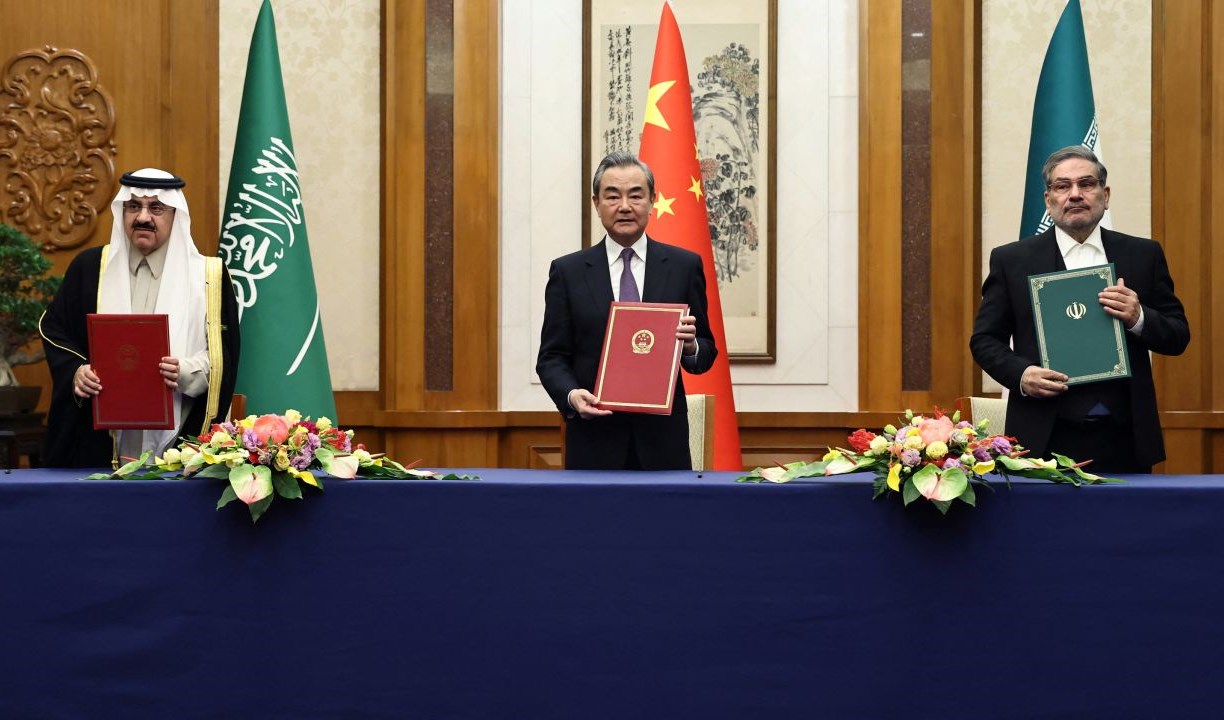The Cradle: Sino-Saudi-Iranian deal contains hidden security clauses
The agreement between the Kingdom of Saudi Arabia and the Islamic Republic of Iran is at its core a security agreement, The Cradle argues.
-

Wang Yi, China's top diplomat, with the Secretary of Iran's Supreme National Security Council Ali Shamkhani and Saudi Arabia's National Security Advisor Musaad bin Mohammed Al Aiban in Beijing on March 10, 2023 (Reuters).
In an exclusive piece published on Sunday, The Cradle argued, based on information revealed by "sources familiar with the negotiations" that a hidden security clause in the bilateral agreement of the Saudi-Iranian Accord mediated by China, marks strong implications beyond the restoration of diplomatic relations.
The agreement, reached between the Kingdom of Saudi Arabia (KSA) and the Islamic Republic of Iran, on March 10, could according to The Cradle be considered either "a historic strategic agreement" at its best or "at its worst" it could be characterized as an "armistice agreement".
The ties between the two countries were severed in 2016 following KSA's execution of Sheikh Nimr Baqir al-Nimr, a vocal critic of the Saudi government, who was arrested in 2011 for participating in protests in the Eastern Province of Al-Qatif calling for political reform.
The agreement entailed five main clauses, "The embassies of Saudi Arabia and the Islamic Republic Iran will reopen in less than two months; Respect for the sovereignty of States; Activating the security cooperation agreement between Saudi Arabia and Iran signed in 2001; Activating the cooperation agreement in the economic, trade, investment, technology, science, culture, sports and youth sectors signed between the parties in 1998; Urging the three countries to exert all efforts to promote regional and international peace and security."
The joint first four clauses, according to The Cradle, appeared to be a restoration of diplomatic ties between the two longstanding rivals; however, the fifth clause, was significant since it "is far from the standard text inserted into joint statements between states."
This agreement's security goals, according to the report, should have been clear through the delegations present in Beijing last week. After all, the agreement was reached between the National Security Councils of Saudi Arabia and Iran with the involvement of their respective intelligence organizations as well as the presence of representatives of the Iranian Revolution Guard Corp on the Iranian end.
The piece highlighted that the new agreement between KSA and Iran proved China's new role as a "peacemaker". A role that the US sought to maintain, but could never have achieved, under the pretense of "security guarantor".
Security imperatives at the core of the agreement: The Cradle
The Cradle said that for Riyadh to be able to carry out its strategic objectives, regional and internal peace and stability are essential. As a result, undisclosed terms were added to the Beijing Accord to guarantee that Iran and Saudi Arabia's security needs would be addressed:
- "Both Saudi Arabia and the Islamic Republic of Iran undertake not to engage in any activity that destabilizes either state, at the security, military or media levels;
- Saudi Arabia pledges not to fund media outlets that seek to destabilize Iran, such as Iran International;
- Saudi Arabia pledges not to fund organizations designated as terrorists by Iran, such as the People’s Mojahedin Organization (MEK), Kurdish groups based in Iraq, or militants operating out of Pakistan;
- Iran pledges to ensure that its allied organizations do not violate Saudi territory from inside Iraqi territory. During negotiations, there were discussions about the targeting of Aramco facilities in Saudi Arabia in September 2019, and Iran’s guarantee that an allied organization would not carry out a similar strike from Iraqi lands;
- Saudi Arabia and Iran will seek to exert all possible efforts to resolve conflicts in the region, particularly the conflict in Yemen, in order to secure a political solution that secures lasting peace in that country."
Significantly, it was noted that no specifics on the war in Yemen were negotiated in Beijing, given that Riyadh-Sanaa talks have recently allegedly advanced.
Iran: Deal a 'political earthquake'
Major General Yahya Rahim Safavi, the advisor to the Iranian leader for military affairs, described the Iranian-Saudi agreement as "a political earthquake" that signals "the end of US hegemony in the region."
"In my opinion, the agreement is in the interests of the two countries and the Western Asia region," he said.
Elsewhere in his remarks, he acknowledged that "the Chinese have decided to become the world’s first economy by 2030," affirming that the agreement between Iran and Saudi Arabia, under Chinese meditation, "dealt the second biggest blow to the US by China."
#SaudiArabia is strengthening ties with China as numbers show that #Beijing and #Riyadh's trading has been increasing significantly, making #China Saudi Arabia's main trading partner. pic.twitter.com/CiFAlI2QPy
— Al Mayadeen English (@MayadeenEnglish) March 1, 2023
Tehran riots Saudi-funded
On November 9, Iranian Security Minister Esmail Khatib said it became clear in the recent events that the Zionist entity was responsible for implementation, the UK media was responsible for sponsoring, and Saudi Arabia was responsible for financial support.
In an interview for Iranian leader Sayyed Ali Khamenei's website, Khatib pointed out that Saudi Arabia provided full financial support for the corrupt Berlin exhibition in the field of advertising, creating spaces, renting photographic equipment, providing facilities for the presence of journalists, and distributing food.
Khatib also pointed out that Iranian security services deem the Iran International media network a terrorist organization and its staff wanted by the Security Ministry, adding that any kind of contact with this organization is considered an entry into the terrorist field and a threat to Iran's national security.
It is worth noting that Iran International TV recently announced it would be shifting studio operations from the UK to Washington.
Read more: Saudi-Iran accord victory for IR, bad for 'Israel': Israeli officials

 5 Min Read
5 Min Read








